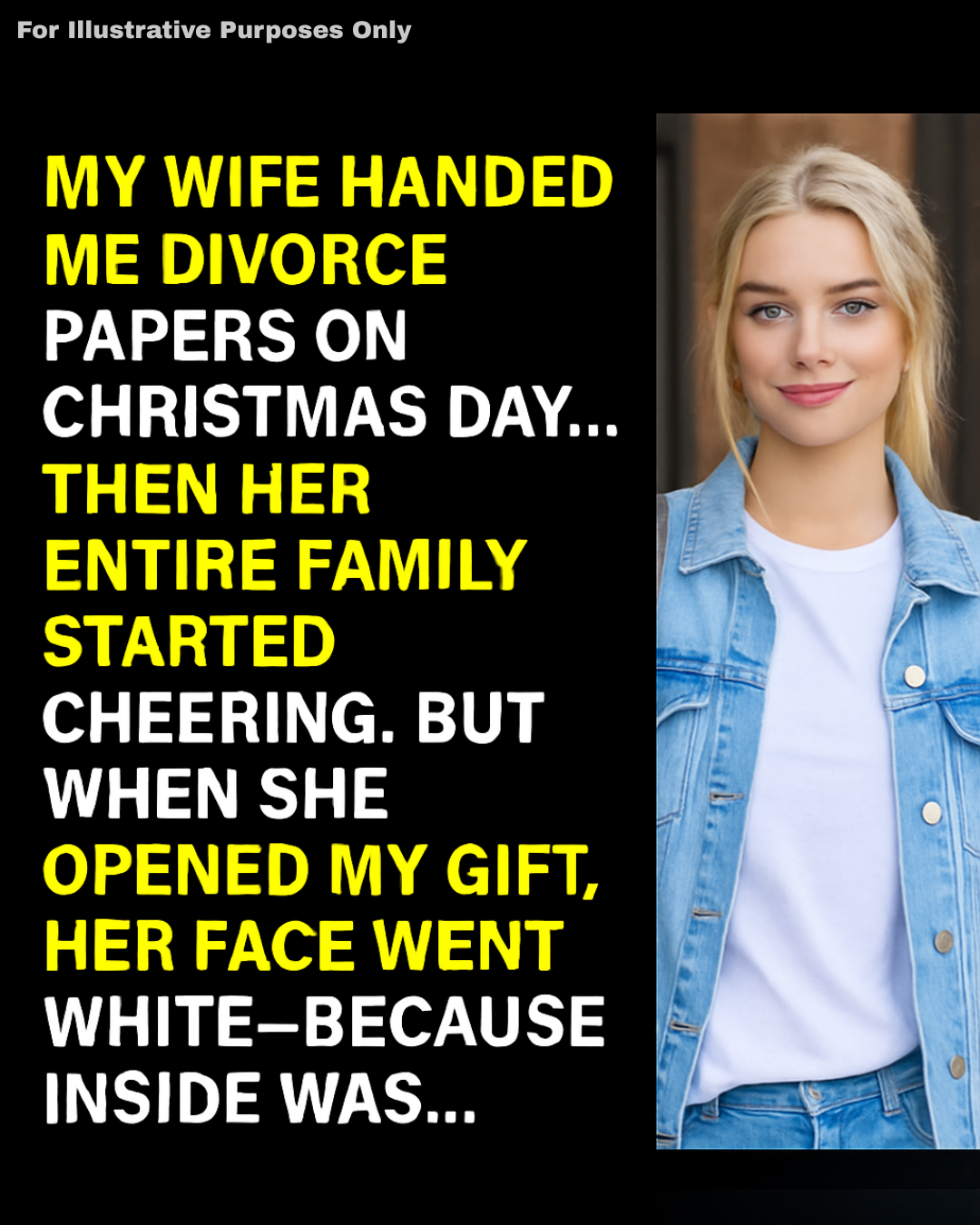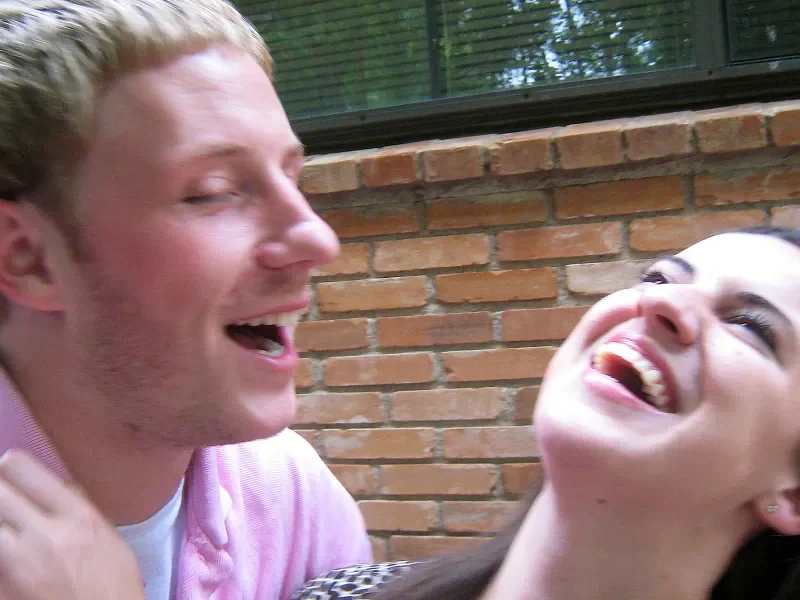Christmas is supposed to be simple: eat, laugh, open gifts, try not to burn the cinnamon rolls. That morning looked exactly like the postcard—snow at the window, a string of lights blinking across my in-laws’ living room, the smell of coffee and clove. What didn’t fit the picture was the thin brown envelope my wife pressed into my hand before anyone had unwrapped a single bow.
“Open this first,” she said, eyes fixed somewhere over my shoulder.
I thought it was a card, maybe plane tickets, maybe a silly scavenger hunt she’d planned. My fingers split the seal, and the air changed. On heavy paper, in a font that looked too calm for what it said, were the words: Petition for Dissolution of Marriage. Below that, a date, a case number, an attorney’s letterhead. All the formal ways to say something informal and brutal: I don’t want this anymore.
I looked up. She didn’t meet my eyes. And then, behind me, the worst sound—applause. Not polite, not hesitant. Cheering. Her uncle clapped me on the shoulder as if we’d finished a team project. “Finally,” he said to the room, “she can breathe.” Someone laughed. Someone said, “New year, new start.” I stood there with the papers in my hands and felt like a spotlight had trapped me in the middle of a stage I never agreed to stand on.
I won’t pretend it didn’t sting. Humiliation has a taste—metallic, like you bit your tongue. But somewhere under the sting, I felt calm. I folded the papers, slid them carefully into my coat pocket, and reached for the small black gift box I’d tucked under the tree the night before. I had imagined giving it to her after breakfast. Now seemed better.
“Before we do anything else,” I said, “there’s something for you.”
The room quieted, the way rooms do when they sense a twist. My wife took the box, fingers hovering over the ribbon. She tugged slowly, like she wanted to delay whatever was coming next. Inside, there was a key, a stack of notarized documents, and a short letter. She lifted the first page.
“Apartment Transfer Deed,” it read, with her name typed neatly where mine used to be. The next page: “Vehicle Registration—Assignment.” The next: “Joint Account—Release of Claim.” My signature in blue ink glowed under each seal. On top, my letter said:
“Your Christmas gift: freedom.
I will not contest the divorce. I won’t ask for alimony, won’t fight over the house or the car. They’re yours. This is the key to your new place. I’ll move out today. One request: let’s end this with honesty. Take what you need. I want only peace. —A.”
Her face went pale in a way the room could feel. The cheering stopped. Her father took off his glasses and looked at me like he was seeing a different angle of the same photograph. Her mother pressed her lips together and stared at the floor. The Christmas music kept playing quietly, a cheerful song that suddenly sounded embarrassed to be there.
Getting to that moment took a year of slow, quiet breaking. We didn’t start badly. We just started different. She loved big tables and crowded calendars. I liked quiet rooms and long projects. At first, our differences were charming, like opposite edges of a puzzle snapping together. Over time, the same edges scraped. She wanted to move closer to her family. I had a career that lived where it lived. She thought “alone time” meant I was upset. I thought “family time” was something you could schedule in reasonable doses.
We stopped listening. That was the real problem. We got good at being right and terrible at being kind. I suggested counseling once; she waved it off with a laugh. “We’ll figure it out,” she said, which really meant “you’ll figure it out.” Weeks turned into months. She angled her phone away when texts buzzed at midnight. I asked if we were still an us. She stared over my shoulder, the way she did when she handed me the envelope.
So I made a decision: if the end was coming, I would not make it uglier than it had to be. I started the paperwork to transfer the apartment. I arranged the title on the car. I opened a small studio on the other side of town and kept a suitcase packed in the trunk. I told no one. Not because I was planning revenge, but because I was planning dignity.
In that living room, dignity felt like a heavy coat that somehow made me warmer. She set the papers down carefully, like they could shatter. “Why are you doing this?” she asked, voice small.
“Because fights have no winners,” I said. “And I don’t want you to be my enemy. You made a choice. I’m making it easier. Let’s end the right way.”
Her uncle studied the ceiling. Her mother busied herself with plates that didn’t need moving. Her father cleared his throat and said, gently, “Sit. Eat. The food will get cold.” It was the kindest thing he’d ever said to me.
We opened the rest of the gifts because there was nothing else to do. The laughter didn’t come back. My wife kept glancing at my letter, then at me, as if trying to locate the trap. There wasn’t one. Guilt is its own trap; I wasn’t interested in setting another.
After breakfast I stepped outside. Snow thickened, hiding tire tracks and footprints. I pulled my small bag from the car—two shirts, a sweater, a pair of jeans, a couple of books, my laptop. I looked at the house one last time. It had been a place of effort more than joy. That used to depress me. Today it felt like the truth, and the truth, even when it hurts, is easier to carry than a lie.
The studio apartment was cold when I walked in. I turned on the heater and set a kettle on the stove. Then I wrote emails—lawyers, bank, work—so the practical pieces could fall into place. I reread the line in my letter that scared me and steadied me all at once: I want only peace. It was a promise and a practice. I would have to choose it every day.
Weeks went by. We saw each other in court, heads down over forms. “I didn’t think you’d actually do it,” she said quietly in the hallway. “Give everything away.”
“I didn’t, not everything,” I said. “I kept my time. I kept my self-respect.”
She nodded, and for the first time in months her eyes met mine without defensiveness in them. Maybe she didn’t need an enemy either.
People later asked if I was angry about the cheering. I was. For a while, that sound woke me up at night. But anger is a bad landlord; it raises the rent and does no repairs. I learned something better: you don’t have to let other people choreograph your pain. You can decide how you stand, how you speak, how you leave.
What did I learn about marriage? That love can’t survive on auto-pilot. That differences are fine until you stop being curious about them. That the opposite of contempt isn’t romance; it’s respect. And if respect disappears, the kindest thing left is a clean ending.
Christmas came around again before I knew it. I strung a single line of lights across the studio window and burned the cinnamon rolls without an audience. I called my parents, then a friend, then walked through the park until my face stung from the cold. I felt sad in places and light in others. Both were honest. Both belonged.
I don’t tell this story to make myself a hero or her a villain. We each did our part to break it. She chose to end it publicly; I chose to end it peacefully. If there’s a moral, it’s this: sometimes the bravest gift you can give is release. Sometimes the truest answer to applause meant to embarrass you is calm.
The envelope she handed me on Christmas morning ended a marriage. The little black box I handed back ended a war. And that, finally, was something worth celebrating.


